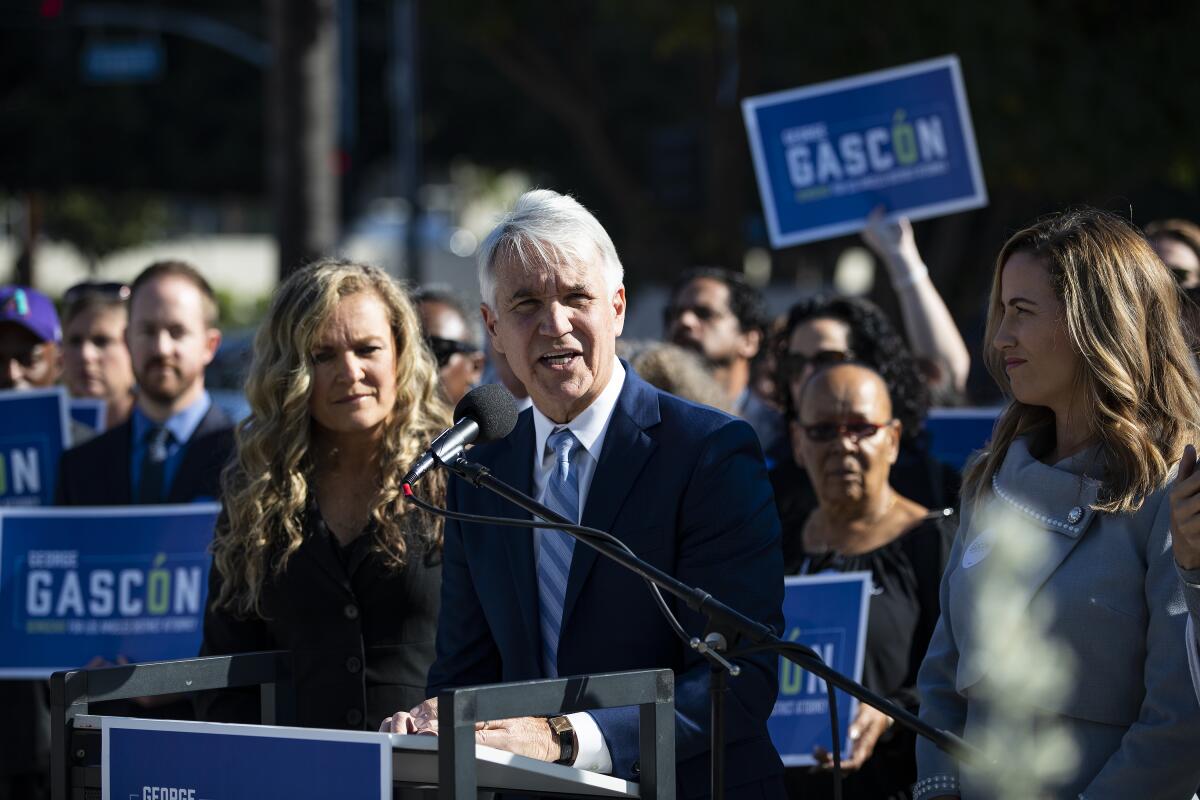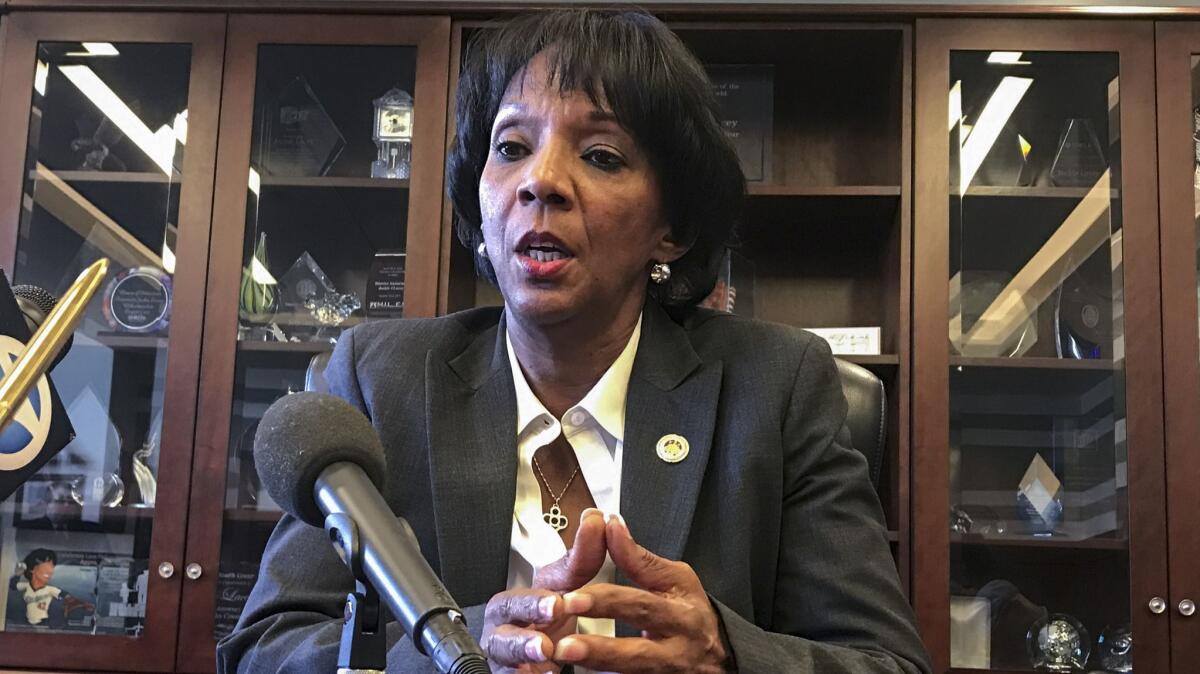George Gascon to challenge Jackie Lacey for L.A. County top prosecutor, in pivotal D.A. race

Former San Francisco Dist. Atty. George Gascon said Monday that he will challenge Jackie Lacey to become Los Angeles County’s top prosecutor next year in a race that may test the political mood for criminal justice reform in one of the nation’s most progressive and diverse cities.
The move serves as a homecoming for Gascon — a former LAPD assistant chief who was raised in Southern California — and crystallizes the 2020 contest as a referendum that could reshape the nation’s largest district attorney’s office, where Lacey has faced growing criticism from many social justice advocacy groups.
Gascon, 65, has earned a reputation as one of the nation’s most forward-thinking law enforcement officials. While police chief in Mesa, Ariz., he spent years battling Sheriff Joe Arpaio over what critics called brutal and humiliating treatment of suspects and immigrant detainees. After a brief stint as San Francisco’s police chief, Gascon was appointed district attorney, championing a number of causes aimed at reducing prison populations and trying to rectify disparate enforcement against people of color.
Before launching into his message of reform, Gascon — flanked by his wife, daughters and dozens of supporters outside the Men’s Central Jail — recounted a story from his teenage years about having his car “torn apart” by sheriff’s deputies in Whittier during what he believed to be a baseless drug search.
“From juveniles to the death penalty, from human trafficking and low-level offenders to the mentally ill, the way the criminal justice system operates must change,” he said.
As San Francisco’s district attorney, Gascon enacted policies that provided alternatives to cash bail and expunged low-level marijuana convictions after Californians voted to legalize the sale of cannabis. In some ways, Lacey has mirrored those moves in recent months, launching a similar plan to wipe out marijuana convictions.
He also co-authored Proposition 47, the controversial ballot initiative that reduced violations for some low-level offenses from felonies to misdemeanors and allowed thousands of defendants statewide to renegotiate punishments for past convictions. Many police officials argue the measure has led to crime increases and criticize Gascon for making policy decisions they contend favor convicted criminals over victims.
If elected in Los Angeles, Gascon said he would implement a number of programs he believes were successful in San Francisco, including diversionary programs for offenders between the ages of 18 and 25 and the use of open source software aimed at removing implicit racial bias from charging decisions.
Gascon has been weighing a run in Los Angeles for most of the year. After announcing he would not seek reelection in San Francisco, Gascon said he began to receive overtures from community members to challenge Lacey. In March and April, he held something of a listening tour, taking part in meetings with social justice organizations and faith groups around the county.
Mike de la Rocha, co-founder of Revolve Impact, a Los Angeles advocacy group that aims to reduce the prison population, said he was impressed that Gascon chose to seek counsel from a broad spectrum of locals before deciding to jump in. Gascon’s experience level, De la Rocha said, makes him a viable progressive alternative to Lacey.
“He wasn’t talking about what he would do, but what he has done and continued to do,” De la Rocha said.

Though he has spent decades wearing a badge, Gascon is expected to face staunch opposition from the law enforcement community. Lacey enjoys broad support among prosecutors and police, holding the endorsements of unions representing Los Angeles police officers and rank-and-file sheriff’s deputies. Her backers also include such prominent elected officials as U.S. Sen. Dianne Feinstein (D-Calif.), U.S. Rep. Adam Schiff (D-Burbank) and Los Angeles Mayor Eric Garcetti.
Craig Lally, president of the Los Angeles Police Protective League, said he believes Gascon often puts politics over public safety, something that has earned him the ire of most rank-and-file police officers and deputies.
“He is the Monopoly candidate for Los Angeles County district attorney, he created a statewide “GET OUT OF JAIL FREE” program named Proposition 47 and the residents of California are paying a heavy price for his misguided and misleading reform effort,” Lally’s union said in a statement issued shortly after Gascon’s announcement.
Gascon is not without high-profile law enforcement supporters, however. Former LAPD Chief Charlie Beck endorsed his former co-worker early Monday.
“Taking on the status quo and reforming our most important institutions requires leadership, strength and a commitment to doing the right thing, even when it comes at great personal cost,” Beck said in a statement. “Those are qualities that define George.”
Gascon scoffed at the barbs from union officials, contending that his opposition to certain police practices should not imply that he is anti-law enforcement.
“If their beef with me is because I take a strong stand against excessive use of force, against discriminatory practices ... then their opposition is something that I welcome,” he said in a recent interview with The Times.
Lacey struck a measured tone in response to Gascon’s entry into the race, highlighting her own reform-minded achievements while welcoming her opponent to the contest.
“We’ve implemented a groundbreaking focus on mental health and treatment rather than incarceration, expunged a million minor offenses for poor and struggling residents, cut juvenile hall cases in half, and cracked down on sex crimes and human traffickers,” she said. “I believe it’s possible to keep our residents safe and make our justice system fairer at the same time, and I am looking forward to having that conversation.”
If the contest boils down to Gascon and Lacey, Los Angeles will become the largest stage yet in a nationwide push to elect more progressive prosecutors. Many reformers have pointed to the victory of Larry Krasner in the 2017 Philadelphia district attorney’s race as a sign of an appetite for change. Similar efforts in California have proved fruitless, with candidates pushed by liberal philanthropist George Soros and the Real Justice political action committee — which supports Gascon — being wiped out at the polls in 2018.
But Gascon has far more law enforcement experience and name recognition than any of those failed past challengers.
Lacey is a Los Angeles-born Democrat, but finds herself challenged by a field of candidates attempting to carve out positions to the left of her own.
In addition to Gascon, Lacey must fend off Deputy Dist. Attys. Richard Ceballos and Joseph Iniguez, both of whom have announced reform-minded campaigns that aim to reduce the prison population and fix what they see as unequal applications of justice.
A March 2020 primary will whittle the field to two contestants, unless one candidate gains 50% of the votes and wins the race outright.
Police use-of-force will probably be a critical issue in the upcoming campaign. Through her eight years in office, Lacey has routinely been targeted by protesters for her seeming hesitance to charge law enforcement officers involved in questionable shootings.
Last year, her office declined to bring charges against an LAPD officer who gunned down an unarmed homeless man in Venice Beach in 2015, ignoring Beck’s unprecedented recommendation to prosecute one of his own officers. The office also infamously declined to charge a Long Beach police officer who shot and killed an unarmed teenager after firing through a window while responding to a minor trespassing call.
Lacey’s office did, however, file manslaughter charges in late 2018 against a sheriff’s deputy who shot and killed a motorist at a Norwalk gas station. The decision marked the first time since 2000 that a Los Angeles law enforcement official had been charged in an on-duty shooting.
Gascon has a similarly spotty record of holding officers accountable in shootings that have drawn public scrutiny, most notably when his office chose not to prosecute the officers who killed Mario Woods in 2015, a case that garnered national headlines.
Though he relishes the opportunity to set a national tone in the discussion on criminal justice reform if elected in Los Angeles, Gascon said his ultimate decision to run came down to what he heard during question-and-answer sessions around the county earlier this year. People across the county, he said, are asking for change.
“I was not going to be an army of one,” he said. “For me, this was something that needed to involve the community across the board.”
Tiffiny Blacknell, a public defender who attended Gascon’s announcement, said she believes voters have a chance to further a national push for a different approach to public safety.
“L.A. is next,” she said. “L.A. is an extraordinarily powerful office ... I think the voters have spoken in various propositions that they want a progressive criminal justice reform agenda, and I think George is a tremendous piece of that puzzle.”
More to Read
Sign up for Essential California
The most important California stories and recommendations in your inbox every morning.
You may occasionally receive promotional content from the Los Angeles Times.











